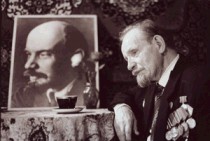
SIELUNPIMENNYS
 Volgan yläjuoksulla Keski-Venäjällä on Euroopan suurin tekojärvi, Rybinski, joka syntyi Stalinin käskystä rakentaa jättimäinen pato. Työntekoon kahlehdittiin kansalaisten miljoonapäistä vankimassaa, josta samalla päästiin eroon. Seurasi katastrofi, jossa hätään joutuivat ihmiset, eläimet, koko luonto.
Volgan yläjuoksulla Keski-Venäjällä on Euroopan suurin tekojärvi, Rybinski, joka syntyi Stalinin käskystä rakentaa jättimäinen pato. Työntekoon kahlehdittiin kansalaisten miljoonapäistä vankimassaa, josta samalla päästiin eroon. Seurasi katastrofi, jossa hätään joutuivat ihmiset, eläimet, koko luonto.
Marja Pensalan ohjaaman Sielunpimennys kertoo terorista ja uhreista, toivottomuudesta ja toivosta, historiasta ja ihmisen muistista, Jotta olisi tulevaisuus, on myönnettävä historian pimeät, tyhjät aukot.
Elokuva rinnastuu muinaisvenäläiseen Kitezin legendaan järveen uponneesta kaupungista, jonne vanhurskaat pakenivat vihollisen tieltä. Legendan mukaan Kitez nousee esiin hyvän voittaessa pahan. Hiljaisella säällä ja peilityynellä voi kuulla vedenalaiskaupungin kirkonkellojen kuminan.
- Pystyttivät muistomerkin Volgalle. Se on pilkantekoa. Ei Volga muistomerkkiä tarvitse, vaan ne ihmiset, kaksi Venäjää, jotka on hukutettu sen pohjalle. Muisto on häviämässä, sanoo kahdeksan vuotta patotyömaalla silminnäkijänä ollut entinen vanki.
Tämän muiston Sielunpimennys pyrkii palauttamaan ja näyttämään.
- Ohjaaja: Marja Pensala
- Tuotanto: Jörn Donner Production, 2000
In English In English In English
ECLIPSE OF THE SOUL
 In Russia when travelling along rivers and coasts, one can suddenly see a church sticking out of the water, in the middle of a lake. You start wondering what it is about - an ecological catastrophe? Indeed. And many other things, too. It is a symbol of a very dark history, about a massive human tragedy.
In Russia when travelling along rivers and coasts, one can suddenly see a church sticking out of the water, in the middle of a lake. You start wondering what it is about - an ecological catastrophe? Indeed. And many other things, too. It is a symbol of a very dark history, about a massive human tragedy.
In Mid-Russia, on the upper reaches of the Volga River, is the Rybinsk reservoir, the biggest in Europe. In 1939 Stalin ordered a dam to be built in order to chain the masses of the millions of prisoners to work and to destroy them. The construction of the unneeded dam led to a catastrophe, in which people, animals and the whole nature were in distress. Volgolag, the second biggest prison labour camp in The Soviet Union after Kolyma was established.
The stories told by different people who lived in what is now an underwater town, parallel and contradict with each other and history grows into one through these individual experiences. The material of the film is the past and the present: unseen archive material, communistic propaganda and liturgy, literature, voice of the people and an old Russian legend. The legend tells that somewhere at the bottom of a lake lies the invisible city of Kitezh. It sank during hard times and will rise when Evil disappears and justice conquers. In a quiet weather one can hear the church bells clanging and see the sunken city.
The legend of the underwater city is a metaphor of Russia like the documentary is a metaphor of the state of the country and the people, in the past and today. Kitezh, the sunken city of hope is down at the bottom, like the Russian U-boat in Barents Sea.
Lenin turned Russia upside down, the way I hang my paintings.
Marc Chagall
In a similar way the film uses mirror images as means of style and meaning. The sunken town of Mologa emerges from the water and starts to live. Water and reflections are just as important means of expression as the shuttered church by the reservoir lakeside where children now play not knowing what the building is.
Eclipse of the Soul is a realistic and yet allegoric documentary film about terror and victims, hopelessness and hope, history and memory. The empty chapters of the past have to be acknowledged and the dark holes of souls to be filled, in order to have a future. The film tends to fill these empty holes of history and return people their memories.
They erected a momument to the Volga. It is a mockery. The river does not need a statue. The two Russias drowned under it need one, as memories fade away, says an ex-prisoner, who spent eight years in the Volgolag camp and saw it all.
- Director: Marja Pensala
- Production: Jörn Donner Production, 2000

Päivitys: 16.11.2000 U.E.